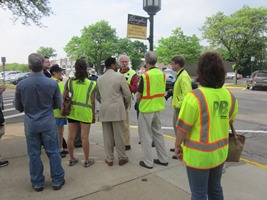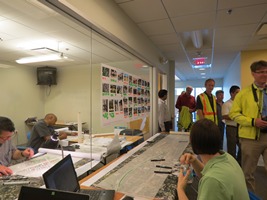First, a brief history lesson. Woodward Avenue, a multi-lane road that stretches over 27 miles, making its way through 11 communities, dates back to 1805 when it was originally platted. In 1909, responding to demand for smoother roads by bicyclists and early auto owners, the first mile of concrete highway in the world was laid. Referred to as metropolitan Detroit’s “Main Street”, Woodward Avenue paves a rich story that is intrinsically connected to Detroit’s legacy as a growing commercial center and as birth place of the American automobile industry. Over the span of a century, as the automobile industry accelerated, so did the development of Woodward Avenue, spurring new businesses and retail growth along its path. In 1999, it was designated a Michigan Heritage Route because of its more than 300 historic sites. It plays host to one of the most iconic celebrations of the car culture the Woodward Dream Cruise.
Project

Community Meetings

With the second in a series of five interactive community events just wrapping up, some themes are emerging: the need to use color and plants to enliven the right-of-way for all forms of transit users; the need to strategically use the preserving and adding of trees as safe buffers between cars, pedestrians and bicyclists; and the need to reduce the speed of cars to foster a more safe environment. (Although it sounds counterintuitive, by decreasing the number of lanes, you calm the traffic without reducing capacity. Burden affirmed this by saying that we squander success when we have an overabundance of lanes.
The first phase of the project hopes to wrap up this fall and a cohesive plan should begin to emerge for all of Woodward Avenue in early 2014. Get engaged and follow Transform Woodward’s progress. To make it really easy, you can download an app and provide your own ideas. Woodward Avenue has shown resilience throughout the ages, growing to accommodate the needs of the automobile. Now it has the opportunity to accommodate the demands of a 21st century economy and lifestyle.